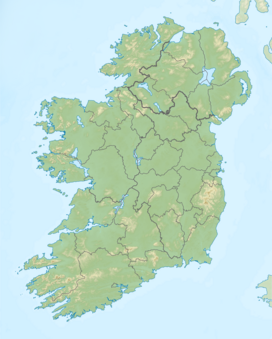Carrickgollogan
| Carrickgollogan | |
|---|---|
| Carraig Uallacháin | |

Carrickgollogan
|
|
| Highest point | |
| Elevation | 276 m (906 ft) |
| Coordinates | 53°13′1.37″N 6°9′27.91″W / 53.2170472°N 6.1577528°WCoordinates: 53°13′1.37″N 6°9′27.91″W / 53.2170472°N 6.1577528°W |
| Geography | |
| Location | Dún Laoghaire–Rathdown, Ireland |
| Parent range | Dublin Mountains |
| OSI/OSNI grid | O23142005 |
| Topo map | OSI Discovery No. 50 |
Carrickgollogan (Irish: Carraig Uallacháin, meaning "rock of Uallachán") is a hill in County Dublin in Republic of Ireland. It is 276 metres (906 feet) high and rises above the village of Shankill on the eastern edge of the Dublin Mountains. Its summit is noted for the panoramic views it offers of south Dublin and north Wicklow.
The author Weston St. John Joyce, writing in The Neighbourhood of Dublin (1912), described the vista as "a fine view is obtained of Bray, Howth, Dalkey, and Killiney, the vale of Shanganagh, and Bray Head and town. Between the observer and the sea will be seen Loughlinstown, looking very closely built from this point, like the towns of medieval times, which were built within as small an area as possible, so as to reduce the circuit of the enclosing wall. To the westward will be seen the wooded hill of Barnaslingan, forming the eastern side of the Scalp, beyond that the Two and Three Rock Mountains, and south of these the higher Wicklow hills – War Hill, Djouce, and Duff Hill".
The geological composition of the summit is predominantly quartzite. The high ground is a mixture of heathland and commercial forestry while the lower slopes are mainly farmland. The forest on the mountain is mixed woodland including Lodgepole pine, Noble fir, Japanese larch, Lawson cypress, Scots pine, birch and beech trees and is a habitat for badgers, rabbits and a variety of birds. The area around the summit includes a number of sites of historical interest including the former lead works at Ballycorus and the ruined church and round tower at Rathmichael.
...
Wikipedia

